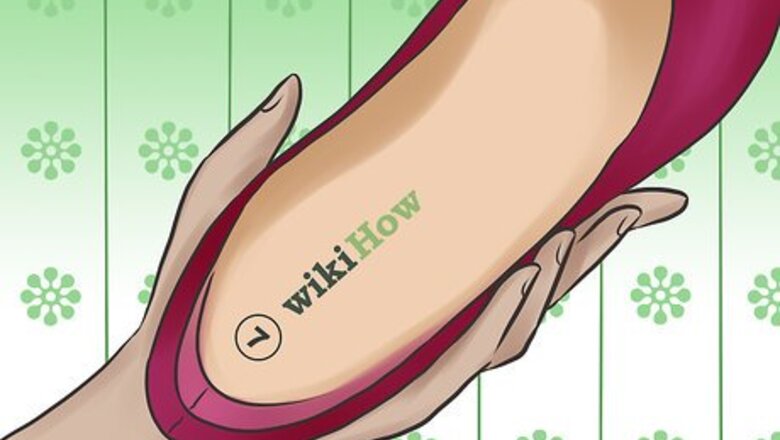
views
Choosing the Right Shoe
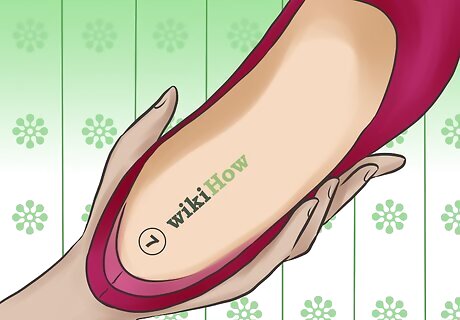
Get the right size shoe. If you have not bought shoes for a while, consider getting your foot size measured at the store. People's feet tend to change sizes as they age, and you do not want to buy a shoe that is too small or too large. Many flats also come in narrow, normal/medium, and wide widths. If you have very narrow or very wide feet, this is something you might want to consider.
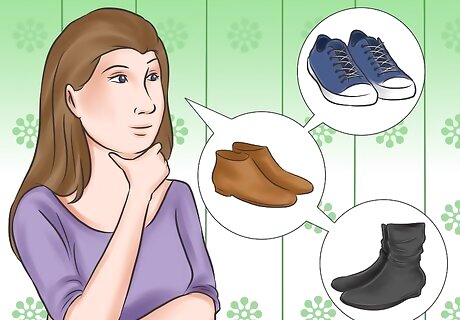
Know that there are different types of flats. Most flat shoes will come in different heights: below the ankle, above the ankle, and boot height. Here are some examples of the different types of flats: Below the ankle flats, such as Converse, moccasins, loafers, pointy-toed flats, and ballet flats, help legs appear longer. Above the ankle flats, such as low boots, military boots, high top Converse, and sandals with ankle straps, tend to make legs look shorter. Flat boots are great for the winter, and can help legs look more slender. Consider getting boots that have a slight dip in the front. These can be flattering on all body types.
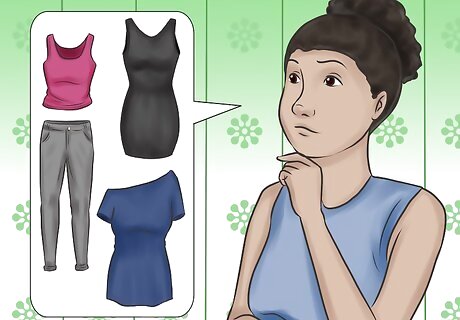
Before you buy a pair, think about at least three different outfits you can wear them with. The more versatile a pair of shoes is, the better. Having fewer shoes that you can build outfits around will also help save space in small closets.
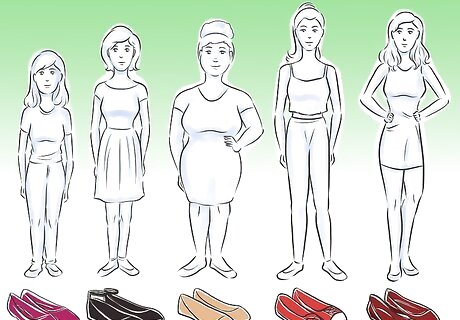
Consider matching your shoe to your body type. Everybody can wear flats, but certain styles paired with certain outfits look more flattering on certain body types than others. If you have a petite body, consider pairing flats with skinny jeans that hit at the ankle. This will help to make you appear taller. Stick to more pointed toes rather than rounded toes. If you have an hourglass shape, wear flats with dresses that finish above the knees. If you have fuller shaped legs, choose flats in a lighter color. This will make what you are wearing the focal point, rather than drawing attention to your legs and feet. Nude-colored shoes also tend to make legs look longer. If you have a tall body, consider pairing flats with a loose top and leggings. If you want to make your legs look longer or leaner, opt for a very slight heel. EXPERT TIP Kathi Burns, CPO® Kathi Burns, CPO® Image Consultant Kathi Burns is a board certified Professional Organizer (CPO) and Founder of Organized and Energized!, her consulting business with a mission to empower people to master their environment and personal image by assisting them in taking control, making change and organizing their lives. Kathi has over 17 years of organizing experience and her work has been featured on Better Homes and Gardens, NBC News, Good Morning America, and Entrepreneur. She has a BS in Communication from Ohio University. Kathi Burns, CPO® Kathi Burns, CPO® Image Consultant Expert Trick: If you have long feet, opt for a more rounded toe or a shoe with horizontal seaming to make your feet look smaller. If your feet are very small, opt for a pointed toe or a shoe with vertical seaming to make them look longer.
Wearing Flats with Pants and Shorts
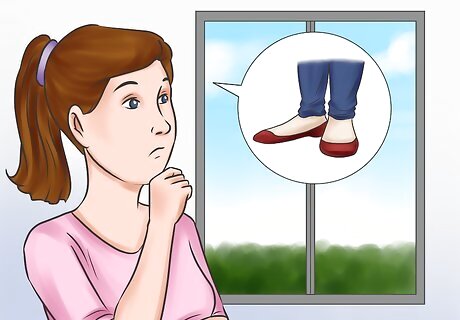
Know how to pair flats with pants. There are different types of flats and pants, and some styles look better paired together than others. Certain types of pants, when paired with a certain type of flat, can also make your legs look longer or shorter. This section will give you different ideas on how to pair pants and shorts with your flats.
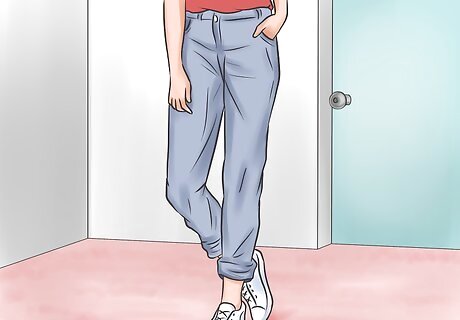
Pair beneath the ankle flats with shorter pants. These sorts of pants include the boyfriend cut, Capri's, and any rolled-up pants. They look especially good with ballet flats, sandals, moccasins, and canvas sneakers. This pairing also helps your legs look longer, especially of the flats are open-top (such as ballet flats). Above the ankle flats can also be worn with shorter pants.
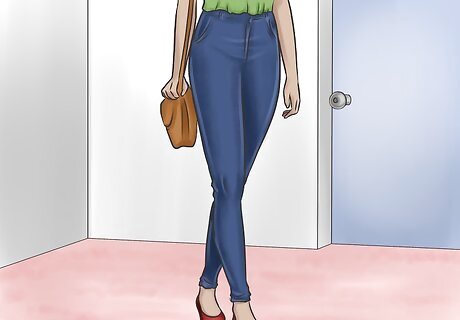
Skinny jeans and other skinny pants work great with all types of flats. If you are wearing above the ankle flats or boots, however, be sure to tuck the pants inside the boot. The one exception to this are high-top Converse sneakers; the jeans won't fit into the narrow cuff of the shoes and should be born over them.
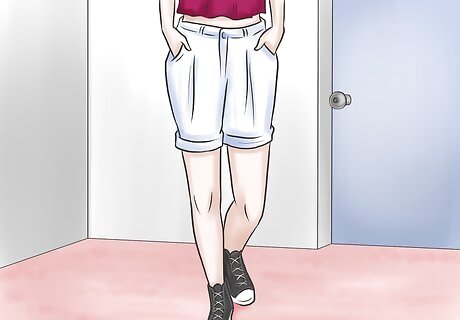
Shorts will look great with above the ankle flats and boots. They will also help your legs look longer. If it is cold, you can consider wearing some tights under the shorts for a punky sort of look. Below the ankle flats can also be worn with shorts, but they will make your legs look even longer. If you have very long legs to begin with, keep this in mind.
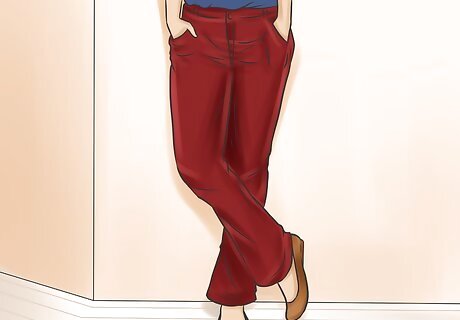
Bootcut and other wider-legged pants will work great with any type of flat. They should never be tucked into a pair of boots, however, or they will bunch up. Consider wearing a pair of pants that are the same color as your boots. This will help your legs look longer. It will also prevent the shoes from "dividing" your leg in half.
Wearing Flats with Skirts and Dresses
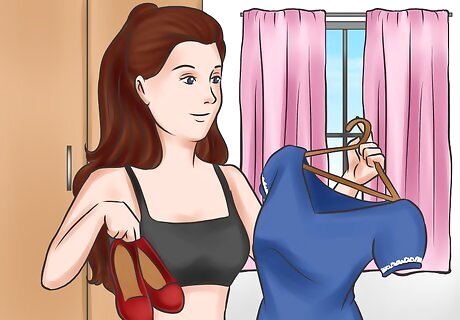
Know how to pair flats with skirts or dresses. Like with pants, different types of flats look better with certain dress and skirt lengths. This section will give you a few tips on how to pair your flats with skirts and dresses.
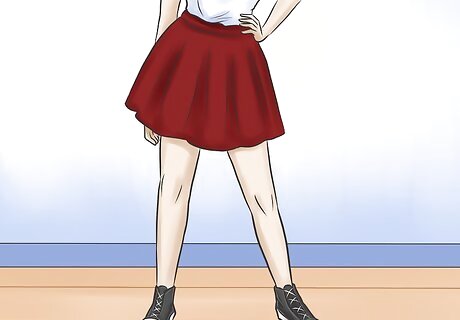
Wear above the ankle flats and boots with shorter skirts and dresses. This will help your legs look longer. Mini skirts are especially great for this.
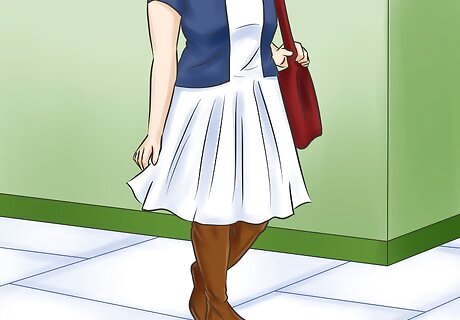
Wear boots with a knee-length or longer skirt or dress. If you are wearing a longer skirt, make sure that there is no skin showing between the hem of the skirt and the top of the boots.
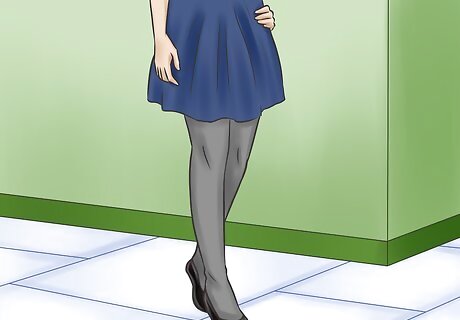
Wear tights under your skirt or dress if it is cold. Try to match the color to your shoes. You can also go for a pair of sheer, nude tights as well.
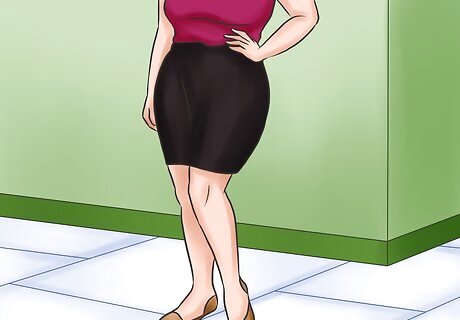
Pair mid-length skirts with below the ankle flats. A-line and pencil skirts work great with pointy-toed flats and dressy sandals.
Wearing Flats Fashionably
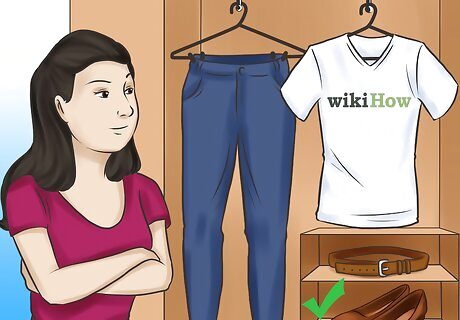
Keep the colors in mind. Try to match your shoes to one color of your outfit. For example, if you are wearing blue jeans, a white shirt, and a brown belt, you could wear a pair of brown shoes. At the same time, you can also wear a contrasting color—just make sure that the tone or saturation are the same. For example, you pair some skinny pants with white canvas sneakers and a black shirt. Keep warm with a black jacket and a red, plaid scarf.
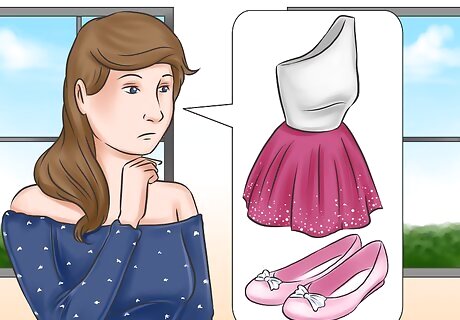
Consider how plain or fancy your outfit is. If you pair fancy shoes with a fancy outfit, you will look overdressed. Instead, consider pairing simple flats with a fancy outfit, or fancy flats with a simply outfit. This will create a nice contrast, and prevent your outfit from looking too busy.
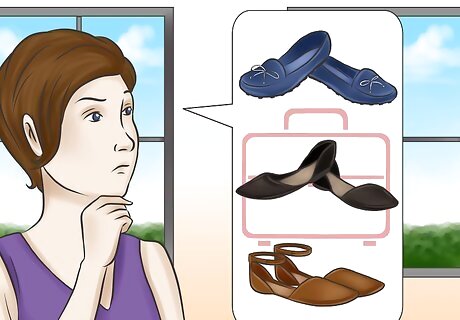
Know what shoes to wear for work. Choosing shoes and outfits for work can be difficult. You want to look good, but you also want to meet the company's dress code requirements. Most important of all, you want to be comfortable, especially if you will be on your feet for long periods of time. Here are some things to consider: If you work retail, refer to your company's dress code to learn what colors and styles of shoe are acceptable. Consider choosing a simple, comfortable flat, such as loafers or sneakers. Most companies will ask you to wear a solid-colored black or brown shoe. If you work in an office, sneakers might be too casual and heels might be too painful. Consider getting a pair of pointy-toed flats. They are the best alternative to painful heels while still looking formal. They work great with dress pants and pencil skirts. A cute work outfit can consist of a white blouse with lace insets, a black pencil skirt, and black pointy-toed flats with ankle straps. Polish up your appearance with some red lipstick, a ponytail or braid, and a classic pearl necklace.
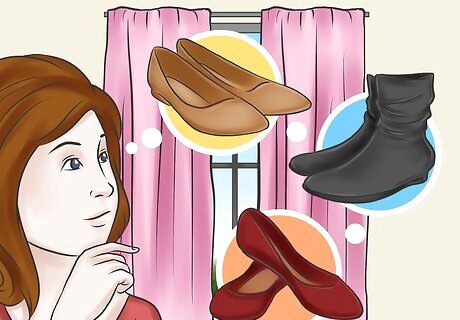
Know what flats to wear to school. Like with work, you want to look good while meeting any dress code requirements (if there are any). You also want to be comfortable, especially if you need to walk far to get from class to class. Choose shoes that are comfortable, and don't wiggle or slip off your feet; the last thing you'd want is to lose a shoe while you are hurrying to your next class. Here are some cute outfit ideas to get you started: In the fall, pair some skinny jeans with pointy flats, a loose-fitting blouse, and a jacket. Keep your hair loose and your makeup simple. In the winter, consider pairing some skinny pants with cozy boots. Wear a long cardigan or sweater over a fitted shirt, and cinch them around your waist with a thick belt. Accessorize with a loose scarf, and keep your jewelry to a minimum; you don't want it to get caught on anything. In the spring and summer, consider pairing some light-colored ballet flats with a flirty, pastel knee-length skirt and a white blouse. If it is colder, switch the skirt out of a pair of skinny jeans.
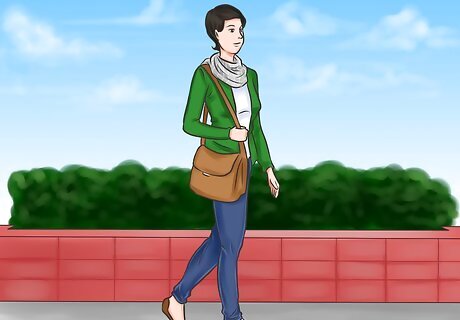
Coming up with casual outfit ideas. Try to pair simple flats with a fancier outfit. Most people associate simplicity with comfort, and comfort with casualness. A simple pair of canvas sneakers or ballet flats does not mean that the rest of your outfit has to be mundane. Here are some ideas to spruce up the rest of your outfit while still looking casual: Accessorize. Wear some jewelry, a cute belt, or a scarf. If you can, try to match your accessories to your shoes. This will tie your entire outfit together. Go with layers. This is a great way to make any outfit more interesting. It will also give your more opportunities to match a piece of your outfit to your shoes. An example of layering would be: skinny jeans, a scoop-necked white blouse, and a green cardigan. Finish the outfit off with a pair of green, pointy-toed flats and a brown belt. Match your shoes to your outerwear. If it is chilly, you can layer your outfit further by throwing on a fashionable coat, a cute jacket, a cozy cardigan, or a flannel shirt. This will not only keep you warm, but it will also make your outfit look more interesting. Again, try to match the color of your outerwear to your shoes.
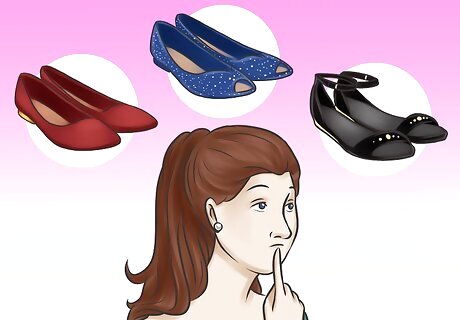
Choosing the right shoes for special occasions and dates. Flats can look casual, but they don't always have to be. There are a few things that can make any pair of flats look dressier. Here are some things you should consider: Pointy-toed flats can look very formal. They are the next best thing to heels. Flats made from patent or metallic materials tend to look more formal than fabric ones. Dress sandals with embellishments, such as silver chains, rhinestones, and brooches can also look very dressy. Try to match your jewelry to these embellishments.
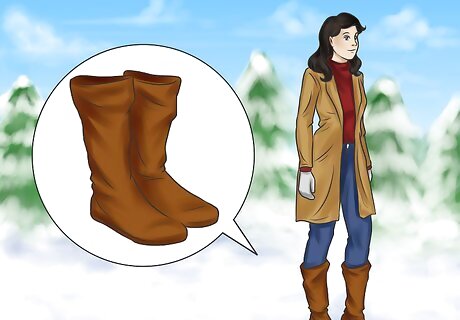
Dress for the weather. Most flats are going to be warm-weather type shoes. As such, you should avoid wearing sandals, ballet flats, and pointy-toed flats during the cold months. Save those for the warmer months. When the cold weather rolls around, stick with boots. You might be able to wear sneakers during the colder months, depending on how wet, snowy, or cold it is.
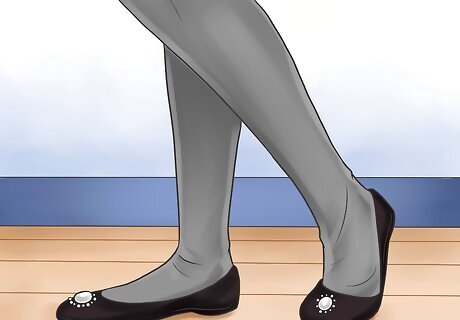
Wear flats with socks to keep warm and reduce sweat/odor. This does not mean that you have to wear thick socks with every type of flat, however. Here are the types of socks you should pair with different types of flats: Wear open-top, below the ankle flats (such as ballet flats) with thin, sheer socks. You can also get low-cut or hidden socks. Below the ankle shoes that do work with socks include: brogues, loafers, creepers, derbies, and Converse. Avoid wearing ballet flats and other open-top flats with socks and tights. This causes the fabric to bunch up and wrinkle in the toe area. Pair above the ankle flats and boots with socks or tights.
Wearing Flats Comfortably
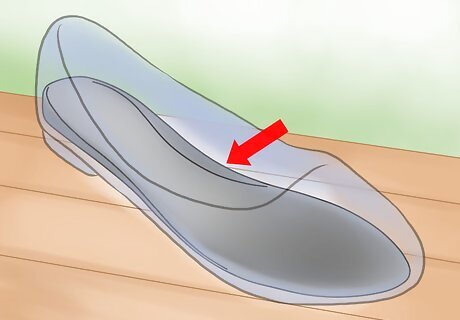
Consider getting an arch support shoe insert. Most flats lack proper arch support. This can make them uncomfortable or painful to wear for some people. If your flats are not comfortable enough for you, check the inside sole and see if there is enough arch support. If not, get a shoe insert that has extra padding in the arch area. It will make them more comfortable to wear.
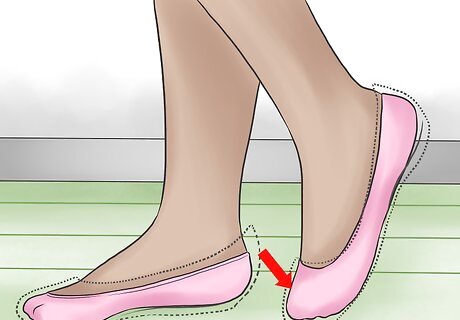
Try to wear flats with socks. Socks help absorb sweat. When you don't wear socks with your shoes, your feet sweat. This can lead to blisters and embarrassing odors. This does not mean that you have to wear crew socks with every pair of flats that you own. For example: Ballet flats and other types of flats that leave the top of the foot exposed won't look very good with crew socks. Consider wearing them with low-cut or hidden-liner socks. They will protect your feet, but they won't show beyond your shoe. Flat sandals will have to be worn barefoot. Fortunately, all those open spaces give your feet plenty of ventilation and reduce sweat.
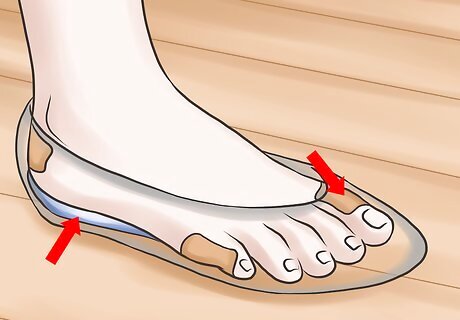
Prevent slipping heels with some heel inserts or moleskin. If you own a pair of flats that slip off the back of your heel with every step you take, you may end up with calluses and blisters on the back of your heel. You can keep your shoes in place with some heel inserts. For example: If your shoes fit well and only slip a little, you might just need a little bit of cushioning, such as a strip of adhesive suede or moleskin. If your shoes are a little bit on the large side, consider getting a cushioned heel insert. It's shaped like a long oval, and sticks right onto the inside of your shoe's heel. They are usually made out of foam or gel.
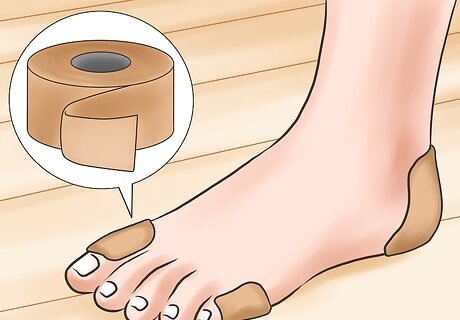
Prevent blisters with strips of adhesive moleskin. If you have a pair of ballerina flats that dig into your heel, or some flat dress sandals that bite into your toes, you might want to consider getting some moleskin. This will help soften any sharp edges and reduce friction. Simply cut the moleskin to the shape of the affected area, peel off the paper backing, and stick it right into the shoe. You can buy moleskin in shoe supply stores, in the shoe department of a department store, or in the orthopedic section of a drugstore/pharmacy.
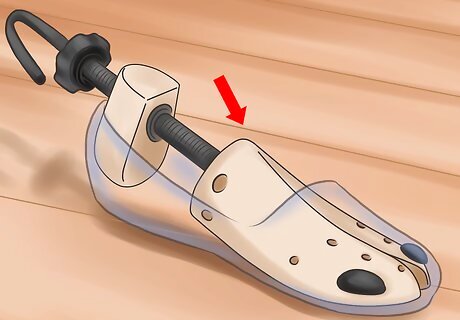
Know how to make too small shoes a bit bigger. Unfortunately, it is very difficult to make shoes made from synthetic materials (such as plastic, vinyl, and pleather) bigger. Fortunately, it is possible to make shoes made out of natural materials (such as fabric, leather, and suede) bigger. Here are a few tips: If your shoes are made from a natural material: put on a pair of thick socks, then put on the shoes. Turn on a hair dryer and blow the warm air over the shoes for a few minutes. Wait until the shoes cool off, then take them off. They should now be a little bit larger. Use a shoe stretcher. Buy a shoe stretcher and put it inside your shoe. Twist the knobs until you get the size you need. Spray the shoe with a special she stretching spray. Wait for the spray to dry before taking the stretcher out. Take the shoe to a shoe cobbler.
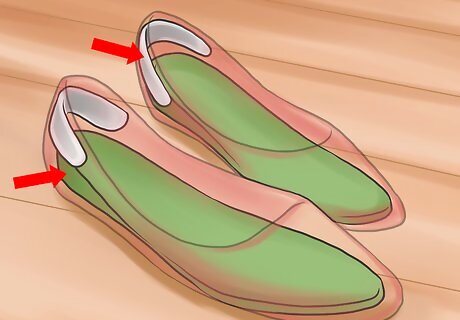
Know how to make too large shoes a bit smaller. You can pad out large shoes made from natural and synthetic materials. You can use insoles and heel inserts to make your shoes a little bit smaller.
















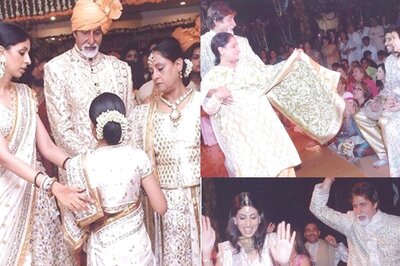
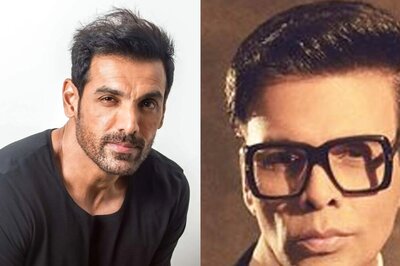
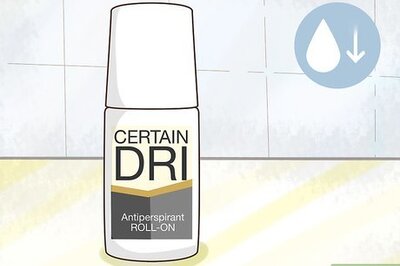
Comments
0 comment